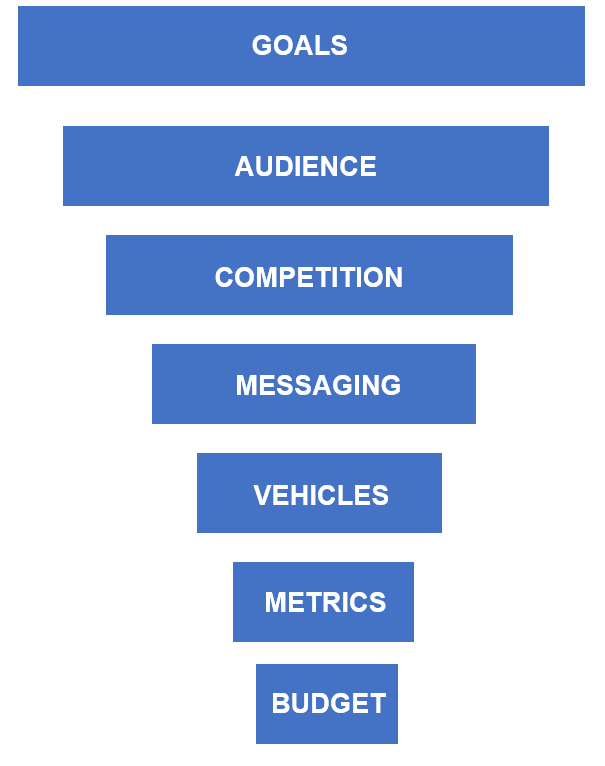
Are you trying to improve the marketing for your law firm?
Better quality inquiries, perhaps? More inquiries? A message that resonates with clients? A look that reflects your professional identity?
Keep reading.
I’ve fielded many questions on law firm marketing, over the years. While normally framed within the unique aspirations and struggles of the lawyers asking, the questions still serve to inform us about law firm objectives, generally.
So, we thought there’d be value in sharing the seven most frequently, recurring questions about marketing strategies for law firms, followed by our answers, of course!
Does every firm need a legal marketing plan?

If I had to pick the single most popular question about marketing strategies for law firms, this would be it.
The answer unfortunately doesn’t have as wide a reach as the question. It is completely situational.
The need for a legal marketing plan isn’t driven by the size of the firm. So, right off the bat, there goes the easiest rule of thumb. Rather, it is driven by many factors, including:
- Focus – If your firm offers only one area of practice and serves only one audience, then the need for a plan is potentially reduced. Decisions about where and how to market organically simplify themselves.
- Competition – If your firm is focused. But you ‘play’ in a relatively competitive space, you may still need a plan to sort through some of the difficult choices about where and how to invest time and money. For example a personal injury firm may face less choices than others. But given the competitive nature of that niche, the stakes are higher. So, there would be value in taking the time to carefully explore each and every option, for fit.
- Market – Some audiences are easier to pin down than others. If you are operating in a narrow business-to-business space, it may be easy to identify where and how to find your prospective clients. For example, for some, SEO may be a waste of time because the players already know each other. Here again, the list of suitable options, organically, whittles itself down.
Once you’ve figured out whether or not you need a plan, you will still need to assess how extensive an exercise this will be. Not all legal marketing plans involve the same effort. For some, the gaps are pretty limited. Hone in the target market, revisit past efforts to see what’s been effective and develop a focused action plan.
But for others, there’s no skipping steps. A comprehensive exercise is needed.
Finally, even if you decide to proceed with a comprehensive plan, recognize that it won’t last for the life of your firm. You will still need to decide how often to update it. Timing will largely depend on how well you are meeting your law firm objectives and the pace at which the market or the firm itself has been changing.
How can the success of marketing strategies for law firms be measured?

This question is usually preceded by another, related question: ‘Should metrics be used to measure marketing strategies for law firms?’. But since the answer is a very clear cut ‘Yes, next question!’, we’re moving on to set up…
The way you set up your metrics is everything. You know the expression, “garbage in, garbage out”? It might not be very elegant. But it makes the point.
Marketing metrics can be extremely insightful about what’s driving inquiries, referrals and more.
But they can also create confusion (getting lost in the weeds with overkill on the detail). Or worse still, they can deliver flawed data that everyone believes is right.
A few examples of the later:
- Firm X measured where inquiries came from, but only to the first level. So, the data revealed that the primary generator of new clients was referrals. As a result, the firm decided to focus its efforts entirely offline. But the data never went any deeper than the surface. So, while referrals at the first level were from existing clients and known referrers, some of the key drivers of that traffic had originally come from LinkedIn. That would have been good to know before making any more decisions, right?
- Firm Y, on the other hand, made several attempts at marketing, including direct mail, blogging and speaking, all of which generated little to no interest. So, when it came time to revisit the plan, the consensus was to begin again, with a clean slate. Every single time! The issue, possibly masked by the metrics, was that it may not be any of the specific legal marketing ideas that were a bad fit. It may simply have been some aspect of the implementation. So, even though the data said there were no results, upon closer examination of the program, fine-tuning, rather than starting over again from scratch might have been a better course of action. It would have allowed firm Y to develop awareness with its audience, as it honed in its formula for success.
The point isn’t to collect lots and lots of data (which can actually be counterproductive). Rather it’s to collect the right data. Start by deciding what success looks like for you. Then create a list of drivers and identify how to best collect data for each of them, whether through web analytics, social media, a chart at everyone’s desk, an intake form or other.
So, instead of using every tool you have to collect data, make intentional decisions about what you want to know and then measure those very factors, as accurately as you can.
How can we maintain our law firm’s professional identity?

This is a big concern for professional services firms, generally, and in particular for lawyer marketing. The question is, how can you ensure that you will be presented in a light that is fitting with your professional identity?
The answer here might be more intuitive than you thought.
Your instincts were right.
There are times when lawyer marketing doesn’t present well. So, while your website might be findable as a result of such efforts, you need to ask yourself what impression it left with prospective clients.
Just like you take great care to dress for success, set up a nice office and train staff to greet clients in a specific manner, the same care needs to go into every aspect of your brand.
In order to be set up to succeed, marketing strategies for law firms need to begin with a clear definition of a unique and valued difference. You will need to develop a communication strategy and employ it to keep the entire program honest.
I have met with many clients that didn’t think they had a real substantial difference from competitors that ‘played’ in the same space. But, through our work together, we were able to ultimately prove them wrong, every single time. This is one instance where clients are happy to be wrong!
There are an infinite number of ways to spell out point of difference, an opportunity that’s usually lost in legal marketing. Just because you have the same services, number of employees and postal code as some of your competitors, doesn’t mean that the experience of working with your firm is the same. And that’s the very point that needs to drive every message across your entire program.
That’s how to maintain your law firm’s professional identity.
How much time and money is really needed to market a law firm?

Let’s face it, when it comes to marketing strategies for law firms, time and money are your scarcest commodities.
But you have choices about how to handle that.
You could just keep spending (one or both) until you either feel satisfied or get fed up, whichever comes first. Or you could try to figure out where you want to go. Then work backwards to identify the most efficient way of getting there.
There are a lot of guidelines out there about the right percentage of billings to set aside for marketing and the number of lawyers for which you need a dedicated marketing person, in-house. The truth is, however, that these decisions should still all be driven by your law firm’s objectives. All the guidelines go out the window, if your goals are anything but standard. If you’re looking to grow aggressively, open a new office (or several), add a new area of practice or drop a service, standards may not get you where you want to go in the time-frame you have in mind.
Standards are more likely to be suitable for maintaining, than building.
What if our partners don’t agree on legal marketing strategies?

It happens.
And it underlines the importance of keeping decisions about marketing strategies for law firms at the leadership level.
So, what do you do when your partners don’t agree?
Well, depending on the issue at stake, this may be a big problem. Or, it may easily be settled with more information or a different process.
If your partners are stuck on decisions about the firm’s presence on social media or whether or not to develop a new law firm logo, these are the types of issues that can resolve themselves with a thorough legal marketing plan. The exercise would take you through the business environment, the pros and cons of the most suitable law firm marketing ideas and lead you to a place where you could make well-informed decisions, with confidence. Ideally, your process adapts to the dynamics of your team and, specifically, invites every partner to use their voice to express any concerns or preferences.
On the other hand, the partners may be stuck on the highest-level decisions about the future. Should we focus more? Less? How should we talk about ourselves? What is our message? A legal marketing plan may still be the answer, with an allowance for a more extensive information gathering exercise. For example, including one-on-one interviews with each of the partners and some of the staff or clients may provide insights that would help to influence the discussion, one way or another.
If the issues run deeper, a law firm retreat or strategic plan may be needed as a preamble to any marketing decisions. This would allow for the leadership team to take a step back and revisit their big picture plans, over an agreed upon term.
What do we need to know about current law firm marketing trends?
Online marketing is changing at an enormously rapid pace. To stay on track with law firm objectives, information about current law firm trends is essential. What worked yesterday may take a quick decline, as soon as you stop monitoring your progress. These days, to rest on your laurels is a recipe for disaster.
Based on the context of the business environment, marketing strategies for law firms need to be vigilantly updated. Some highlights of current law firm marketing trends, include:
- Mobile relevance continues to build
- Secure websites (with SSL certificates) are raising favour with Google
- Online ratings are having impact with both search rankings and conversion
- Articles that answer questions trump promotional content
- Law firm videos are growing in popularity and the quality is improving
- Facebook advertising, pay per click and other online advertising are becoming viable options, as organic SEO becomes increasingly challenging
- Social media strategies for lawyers are becoming more customized and engaging
- While blog articles are getting longer, videos are getting shorter
- Law firm branding is becoming less focused on logos and names and more focused on professional identity
What are the top 3 marketing strategies for law firms?

While there are no one-size-fits-all marketing strategies for law firms, there are some general guidelines. Here are our top 3:
#1: A focused strategy delivers better return. It’s also easier and cheaper to run. We’re going beyond honing in the firm’s services and target market (all of which is good!) here. This point is about considering other ways to focus. For example, you can choose between focusing on referrers, existing clients or prospective clients. You can choose between focusing online or off. You can even choose between blogs, seminars, events, video and social media. You don’t have to do it all, even if that’s what your competitors are doing. You will get further ahead, with less resources, if you intentionally choose where to spend your time and money. There are many creative ways of going about establishing such a focus for your legal marketing plan.
#2: Employees can be your best ambassadors. There is no better win than transforming employees into ambassadors. But, how? Firstly, launching your brand, mission and marketing program shouldn’t be considered an external exercise. Launching internally is, at least, as important. If the lawyers and staff buy in to the program and feel excited about it, they’re more likely to, voluntarily, share the news among their own networks, online and off. And you can go a step further than simply launching the program internally. You could create a marketing committee or otherwise invite participation and collaboration from your employees. Their voices would be integrated into the final product. As well, any messaging that gets informally distributed, by way of their personal networks would, as a result, be consistent with the firm vision.
#3: Strategy belongs at the leadership level. While running a marketing program may involve administrative duties, the decisions that drive its direction have serious ramifications in terms of how the firm will look in both the short and long term. These decisions need to be tied to other strategic considerations like the law firm’s strategic plan, business plan and succession plan, in order to wind up where you want to go.
Whether you decide to hire a marketing consultant or staff or do-it-yourself, you will still be facing a learning curve. At the end of the day, it’s the firm principal, managing partner or marketing committee that will ultimately be responsible for the results of all these strategies.
So, like a strong CEO would do in other sectors, your job is to learn what you need to learn. Then surround yourself with advisors that will help you to fill in the gaps, go after your goals and remain nimble in the face of constant change!
At Bekhor Management, our approach is focused on what really works to build and enhance small to mid-sized, law firms and other Canadian, professional services firms. We invite you to book an initial consultation to discuss your practice goals.
—
Related legal marketing tips (video):
Related articles on how to market a law firm:
Lawyers, Don’t Miss This Step in Your Marketing Plan
Strategy the key to getting things done on a firm retreat
Marketing playing vital role in a growing online world (for lawyers)











I totally agree with what you said that one of the factors that drive the need for a legal marketing plan is focus. It is always good to come up with a legal marketing plan where you are able to specialize in different departments but at the same time designating different people to specifically concentrate on one specific field alone. This way, you are able to manage a variety of cases and at the same time cater to different people and clients. If I ever need to designate a legal marketing plan, I would make sure to take this into account. Thanks.